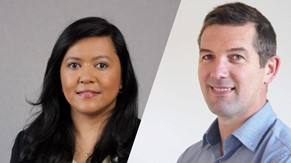April 2025 International Science Qualification News
This update is for teachers of International GCSE and International A Level courses in biology, chemistry, physics and science.
We are excited to announce the launch of our new Facebook group for teachers of our international science qualifications, and hope that many of you will join and use this forum to ask questions and to support each other.
We also have news here of examiner vacancies for the coming exam series, a range of training resources available and answers to teachers' frequently asked questions.
As ever please don't hesitate to get in touch if you would like to discuss any aspect of our courses.
Best wishes,
Tim Lawrence
Pearson Edexcel Subject Advisor for International Science Qualifications
In this update:
- Key dates
- International Science teacher Facebook group
- Examiner vacancies for IG and IAL
- International GCSE modular revision support training materials
- Equation sheets for International GCSE physics exams
- International A Level biology - pre-release article
- International GCSE science - free Maths in Science worksheets
- Training available - on-demand and future live events
| 22 April | 'Late fees' (double fees) for May/June 2025 exam entries become 'higher late fees' (triple fees). |
| 14 August | UK A Level and IAL results to candidates. |
| 21 August | GCSE results to candidates. |
In March we launched our new Facebook group for teachers of Edexcel International GCSE and IAL science courses. This follows the launch of similar groups for other subject areas in recent months. We have found that teachers of Edexcel international qualifications in particular have engaged really well with this opportunity to ask and answer questions and share advice regarding the teaching of IG and IAL courses.
Visit our Facebook group for teachers of International Science courses
We currently have vacancies for Assessment Associate (examiner) roles for the June 2025 exam series. This is a great opportunity for teachers to gain a deeper understanding of how exam questions are marked, which can be very helpful when preparing students for future exams.
In the job adverts listed below examiner roles are generally listed as 'full time' but in fact they are designed for serving teachers who are also teaching full time. Contracts generally assume you will mark for two to two and a half hours per day, five days per week (but in practice many examiners mark at weekends). The marking window depends on the paper and the series but is usually 7-21 days.
We recently delivered live training for teachers preparing students for the first modular International GCSE science exams which are coming up in May and June, and recordings of these sessions are now available:
Youtube Video Title
Youtube video contentRelated Videos
The delegate packs for these sessions including the presentation slides can be downloaded now from the 'teaching and learning resources' sections of the qualification pages or via the links below.
Apologies to chemistry teachers who attended that the delegate pack shared included the physics version of the presentation, please find the correct version below.
All candidates for Edexcel International GCSE physics exams (for linear and modular courses, IG physics, Double Award and Single Award science) will be provided with a full equation sheet for exams in 2025, 2026 and 2027.
At the time of writing this update the modular equation sheet is yet to be published, but candidates will be provided with the same equations as those sitting linear IG physics exams. The linear equation sheet can be downloaded following the link below.
For IAL biology unit 5 (WBI15) candidates have questions on a scientific article which is pre-released six to eight weeks before the exam. The article for the WBI15 exam in June is available to download now from the teaching and learning materials section of the qualification web page - see the link below. An Edexcel Online login is required.
Students can annotate a copy of the article as part of their preparation for the exam, but cannot take this version into the exam. They will be provided with a 'clean' copy with their exam paper.
The questions below have been asked during our live training events recently, or in emails to teachingscience@pearson.com:
Yes, while we expect most schools to teach Unit 1 first, there is no barrier to candidates sitting Unit 2 first if you prefer to teach the course in a different order. It is also perfectly acceptable to enter for both modular exams at the end of the course, or to enter candidates in different exam series for different GCSE subjects.
For example they could enter for biology and physics Unit 1 exams in the June series at the end of the first year of the course, Unit 1 for chemistry the following November (along with a re-sit in biology or physics if needed) and the remaining units at the end of Year 2.
Yes, this is a feature of the linear International GCSE exams and will be for the modular exams too. It means that the questions at the beginning of the paper will tend to be more accessible, helping candidates to 'ease in' to the exam, with questions on average becoming more challenging as they progress through the paper.
No, as the subject content is the same for linear and for modular International GCSE science exams there is no separate set of textbooks or Teaching Hubs teaching and assessment materials, and there are no plans currently to produce these. However if you have requests for specific resources which would be useful in your teaching of the modular courses please do get in touch using the contact details on this page.
One set of Sample Assessment Materials (sample papers) is available for each of the modular International GCSEs, with a second set due to be published in August 2025.
For additional practice papers we recommend using examWizard to construct papers from past linear questions. As the question style for the modular papers will be the same, linear past paper questions are suitable for this purpose. Our free examWizard tool allows you to search linear past paper questions by modular unit or topic.
Alternatively, for modular biology, chemistry and physics students we suggest using linear Paper 2 exams (since these cover all of the 'separate' physics, chemistry and biology content), but for students who have only covered Unit 1, removing those questions which they have not covered and replacing these with questions from another paper. For Double Award science candidates linear Paper 1 exams can be used.
We have had some queries recently about the detail International GCSE (IG) chemistry teachers need to go into regarding the extraction of iron and aluminium. This is covered in some detail in textbooks and our example scheme of work has suggested activities relating to these points.
These are the relevant specification points with their linear IG chemistry codes, the modular codes are 2.9C and 2.10C:
2.23C explain how the method of extraction of a metal is related to its position in the reactivity series, illustrated by carbon extraction for iron and electrolysis for aluminium
2.24C be able to comment on a metal extraction process, given appropriate information
detailed knowledge of the processes used in the extraction of a specific metal is not required
Teachers are advised that the specification, rather than any textbook or other resource, is the definitive guide to the content that needs to be taught, and this states that candidates do not need detailed knowledge.
Here is some further guidance:
- questions could ask for the equations for the processes involving iron and aluminium (which in any case are covered in 1.25).
- they may ask about the extraction of other metals, even unfamiliar ones – provided that information was given about position in reactivity series.
- what could not be asked are questions about reaction conditions such as temperature, nor those requiring the drawing of a diagram of a blast furnace or electrolysis cell – see the italic wording in 2.24C.
- a diagram of a blast furnace or electrolysis cell may be provided in a question, as this would be covered by the wording ‘given appropriate information'.
Having covered these processes in the detail shown in some textbooks, and undertaking the activities in the Scheme of Work, could therefore be helpful to students.
Yes, while it is not possible to enter for both modular and linear exams in the same subject in the same exam series, it is possible to switch between the assessment paths for a new exam series.
Candidates won't get a certificate for a single unit of a modular GCSE, so if they were to take three subjects in the first year, and continue two for the second year, they would only finish with two GCSEs (in the subjects they took both units for).
Like our International A Levels, our modular International GCSEs will use a 'Uniform Mark Scale'. Raw marks on each paper will be converted to UMS marks using a unique formula, set by the examiners for each exam paper (this is how grade boundaries for that specific paper are set). The UMS ensures consistency of contribution towards the overall grade for units which may be taken in different exam series. Unlike raw mark grade boundaries, UMS grade boundaries are fixed and (in terms of % of the total UMS) are the same for all subjects.
For IAL qualifications, the A* grade is awarded for 90% of the UMS across the IA2 units (with no requirement for meeting this for each unit - it's the total that counts) and 80% of the total UMS across all IAS / IA2 units.
No, exam questions will assess candidates' knowledge and understanding of the core practical activities, and it is strongly recommended that they carry them out themselves if possible. However these are not a requirement of the course (in contrast to the UK A Levels and GCSEs), and if it is not possible to carry out a particular practical then it is acceptable to teach it using other methods, such as a live or video demonstration.
Exams officers can request modified papers with larger font sizes for candidates with visual impariments. They can also apply for 'access arrangements' including extra time in exams in specific circumstances - Edexcel International qualifications follow the guidance of the UK exam regulator the JCQ - see their guidance below.
Our Teaching Hubs resources help to support inclusive teaching and learning by providing quality first teaching materials. If you don't yet have access to Teaching Hubs then you can find out more from your local Pearson consultant - see below.
Onscreen assessments, which are being rolled out to an increasing number of schools currently, are another way exam accessibility can be improved for students with disabilities, inclduing the potential for the use of text-readers.
There are a number of free face-to-face training events for chemistry and physics teachers coming up in April and May, in Bangladesh and Pakistan for example.
The Pearson Development Academy website is the place to look for upcoming and on-demand training events, including face-to-face events. The link below will take you to filtered lists for International GCSE and International A Level training.
Below are links to YouTube playlists featuring recordings of past online training events and 'on-demand' training. Those recent recordings which use exam materials from the past 12 months do not feature in these public playlists however. Teachers with Edexcel Online logins can access these by going to the relevant qualification web page, then looking in 'past training content' on the 'teaching and learning materials' page. Locked documents with links to unlisted videos of the recent training can be found there.
Subject advisor
Irine Muhiuddin and Tim Lawrence
UK and International Science

